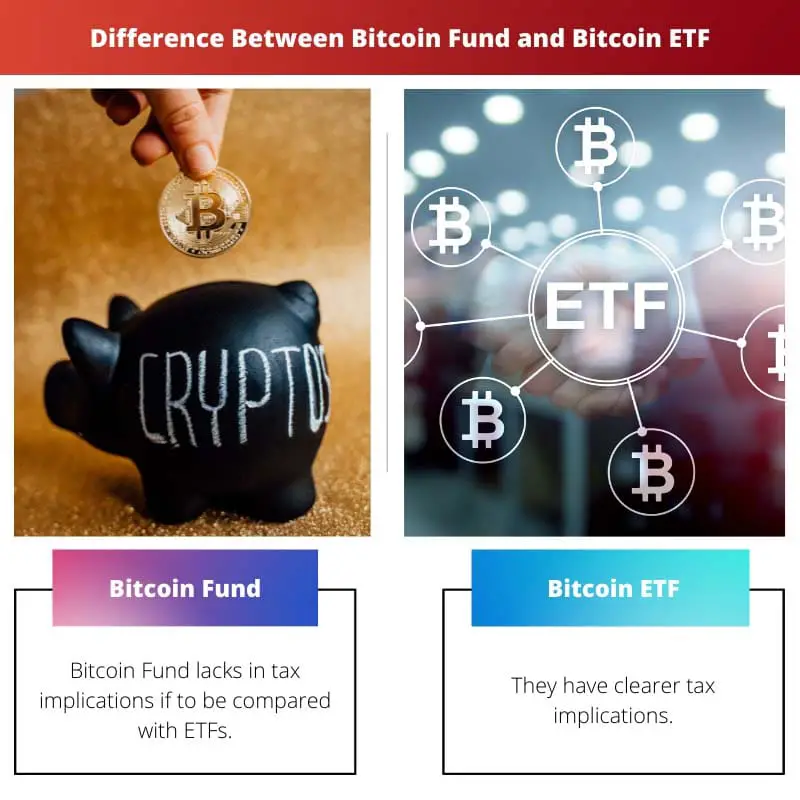“Every informed person needs to know about Bitcoin because it might be one of the world’s most important developments.” This is a quote by the two-time Nobel Peace Prize nominee Leon Louw.
Bitcoin is no doubt the largest form of cryptocurrency. It has now become a very popular item to invest in. Many major companies own this cryptocurrency, and some even have started using them to pay the salary of their employees.
Key Takeaways
- A bitcoin fund is an investment fund that allows individuals to invest in bitcoin without having to purchase and store the cryptocurrency. In contrast, a bitcoin ETF is a fund that tracks the price of bitcoin and can be traded on a stock exchange like a regular stock.
- Bitcoin funds are managed by professional investors with experience managing cryptocurrency investments, while large financial institutions manage bitcoin ETFs.
- Bitcoin funds are only available to accredited investors, while bitcoin ETFs are available to anyone with a brokerage account.
Bitcoin Fund vs Bitcoin ETF
A Bitcoin fund is an investment pathway making people invest in Bitcoin without owning cryptocurrency, collecting investors’ money on their behalf. A Bitcoin ETF or exchange-traded fund that tracks the price of Bitcoin gives investors exposure to Bitcoin’s price movements through traditional stock exchanges without directly managing Bitcoin themselves.

Bitcoin Fund is a pool of resources by a number of investors who invest in Bitcoin for the result of profit in the future. There are many companies one can invest in to take part in the Bitcoin Fund.
Bitcoin ETF is short for Bitcoin exchange-traded funds. They allow the public to buy and sell, all over, trade this particular cryptocurrency easier and at a lower price.
Comparison Table
| Parameters of Comparison | Bitcoin Fund | Bitcoin ETF |
|---|---|---|
| Another name | BTC fund | Bitcoin Exchange-Trade Fund |
| Tax implications | Bitcoin Fund lacks in tax implications if to be compared with ETFs. | They have clearer tax implications. |
| Founder Company | Grayscale Bitcoin Trust (GBTC). | The Purpose Bitcoin ETF (BTCC) and the Evolve Bitcoin ETF (EBIT) |
| Year of launch | 2013 | 2021 |
| Liquidity | Funds take more time to liquidate. | Bitcoin ETF’s are a little easier to liquidate in comparison to Funds. |
What is Bitcoin Fund?
Bitcoin Fund is a type of fund where a group of people can pool their resources and investments and start to trade, that is, the selling and purchasing of Bitcoins over the internet.
The client-facing Bitcoin Fund is a new thing, though not being popular right now but is slowly getting better while it receives reputation as more and more people start to get the value of Bitcoin and what advantages the currency can bring to the people.
These Bitcoin Funds can be used by long-term wealth creators by someone who is just getting into the cryptocurrency Bitcoin market and wants to learn the basics of things.

What is Bitcoin ETF?
Bitcoin ETF is a bundle of pooled resources by a number of investors. They are used by these investors in order to diversify their portfolios. The first official ETF, “COIN” bitcoin ETF was released in 2013 but was rejected.
Bitcoin ETF, is particular, is an investment that tracks the performance of the purchased item or asset. One does not need to trade in Bitcoins if they buy Bitcoin ETF.
Bitcoin ETFs, like Bitcoin Funds, are different from actively managed funds since both of them are used for investment as a long-term wealth creation by the investors.

Main Differences Between Bitcoin Fund and Bitcoin ETF
- Closed-end Bitcoin Funds can only hold a particular number of shares for people. In comparison, Bitcoin ETFs can create new shares.
- Bitcoin Funds are older, the year being 2013 than Bitcoin ETF, where the first Bitcoin ETF launched in 2021.

As the popularity of Bitcoin increases, the availability of investment options like Bitcoin funds and ETFs expands. Understanding the differences in tax implications and liquidity of Bitcoin funds and ETFs is crucial when navigating the cryptocurrency market.
Cryptocurrency investors can benefit from considering the specific characteristics of Bitcoin funds and ETFs, such as the companies involved and the tax implications. These details contribute to informed investment strategies.
Investing in Bitcoin has attracted significant attention as it provides opportunities for profit. Bitcoin funds and ETFs are important methods that allow diversifying investors’ portfolios. The tax implications and liquidity of these options vary.
The availability and associated tax implications of Bitcoin funds and ETFs are important factors to consider when making investment decisions. It’s essential to understand the characteristics and differences between these investment options.
The Grayscale Bitcoin Trust (GBTC) is an example of a Bitcoin fund, while the Purpose Bitcoin ETF (BTCC) and the Evolve Bitcoin ETF (EBIT) are examples of Bitcoin ETFs. Notably, Bitcoin funds and ETFs differ in their year of launch.
Having the ability to invest in Bitcoin through a fund or an ETF offers flexibility and diversification for investors. Furthermore, the creation of new shares in Bitcoin ETFs distinguishes them from Bitcoin funds.
The tax implications and founder companies of Bitcoin funds and ETFs provide important insights for investors considering these financial products. It’s advisable to evaluate these differences to make informed investment decisions.
The differences in the liquidity and year of launch of Bitcoin funds and ETFs are worth noting as they indicate variation in the accessibility and historical background of these cryptocurrency investment options.
The availability and distinct features of Bitcoin funds and ETFs offer valuable opportunities for investors seeking to engage in cryptocurrency trading. Evaluating the differences in tax implications and liquidity supports well-informed investment decisions in this dynamic market.
Cryptocurrency investors should consider the year of launch and liquidity of Bitcoin funds and ETFs, as these factors elucidate the historical background and accessibility of these investment products. Understanding these aspects is crucial for informed investment strategies.
The evolving landscape of Bitcoin funds and ETFs reflects the growing interest in cryptocurrency investments. Investors can benefit from recognizing the unique characteristics of these investment vehicles, such as the founder companies and tax implications, to navigate the dynamic cryptocurrency market effectively.
The introduction of Bitcoin funds and ETFs reflects the growing interest in cryptocurrency investments. Differences in tax implications and founder companies contribute to the distinct characteristics of these investment options, offering tailored solutions for diverse investment goals.
Careful consideration of the tax implications and liquidity of Bitcoin funds and ETFs allows investors to make informed decisions and identify investment opportunities that align with their financial objectives.
Bitcoin is currently one of the most popular cryptocurrencies and companies are investing in it, even offering Bitcoin as a salary. There are various ways to invest in Bitcoin, such as Bitcoin funds and Bitcoin ETFs. The difference being that a funds collects investors’ money to invest in Bitcoin, while an ETF allows investors to track the price of Bitcoin without directly managing the cryptocurrency.
There are clear tax implications in the case of Bitcoin ETFs, making it different from Bitcoin funds. Also, the liquidity of the two options is different, with Bitcoin ETFs being easier to liquidate.
The introduction of Bitcoin funds and ETFs denotes the increasing accessibility of cryptocurrency investments. Careful evaluation of the tax implications and liquidity of Bitcoin funds and ETFs empowers investors to make well-informed decisions tailored to their investment objectives.
Cryptocurrency investors can maximize their investment strategies by leveraging the differences in availability and tax implications of Bitcoin funds and ETFs. Understanding these unique features enables investors to navigate the dynamic cryptocurrency market effectively.
Bitcoin funds and ETFs enable diverse investment strategies for individuals interested in cryptocurrency. The availability and liquidity of these investment options influence the investment decisions made by cryptocurrency traders.
The emergence of Bitcoin funds and ETFs provides new opportunities for investment diversification, catering to the needs of different investors. Furthermore, distinguishing factors such as liquidity and year of launch offer valuable insights into these investment vehicles.
Understanding the fundamental differences between Bitcoin funds and ETFs, particularly in terms of their tax implications and liquidity, is essential for investors seeking to navigate the cryptocurrency market effectively.
Bitcoin fund allows pooling resources to invest and trade in Bitcoin without owning the cryptocurrency. Meanwhile, Bitcoin ETF offers exposure to Bitcoin’s price movements through traditional stock exchanges. Both options are suitable for long-term wealth creators.
Indeed, Bitcoin ETFs offer the public an easier and less expensive way to buy, sell, and trade cryptocurrency. Additionally, Bitcoin funds and ETFs differ in the way new shares are created.
The features of Bitcoin funds and ETFs, such as the availability and liquidity, present unique characteristics that cater to the diverse investment preferences of cryptocurrency traders. Understanding these factors is essential for devising successful investment strategies.
Cryptocurrency investors can leverage the distinct features of Bitcoin funds and ETFs, taking into account the year of launch and tax implications to optimize their investment portfolios effectively.
The burgeoning market for Bitcoin funds and ETFs underscores the evolving landscape of cryptocurrency investments. Recognizing the significance of liquidity and tax implications empowers investors to make well-informed choices in the dynamic cryptocurrency market.